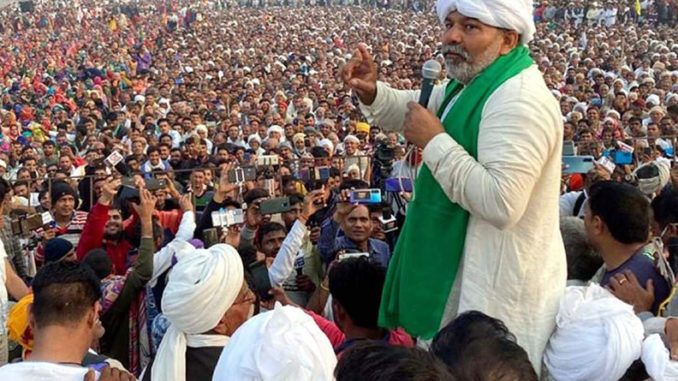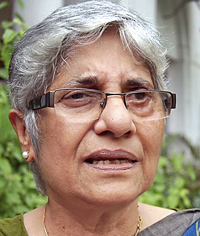
Modi obviously calculated that advantage lay in taking a step back on farm laws

The BJP can live with defeats in smaller states, but winning Uttar Pradesh in 2022 is essential for the party, or else 2024 becomes dicey.
“Modi must have calculated that at the end of the day, he will be able to mollify the Jats. Even that ‘little bit’ will help. The BJP brass must have also been worried about the enthusiasm evident at the meetings addressed by Samajwadi Party leader Akhilesh Yadav. His in-principal ally, Jayant Chaudhary of the RLD, has also encountered an exciting response in western UP, not accorded to his party in the past 20 years. The BJP was happy with Priyanka Vadra getting some traction — and it may even be aiding the process — for it would create confusion amongst the Muslims. But that does not seem to be happening at the ground level.”
By announcing to repeal the three controversial farm laws, the Prime Minister has stooped to conquer. His reason for backtracking, something Narendra Modi is not given to do, is political. It can be summed up in two words — Uttar Pradesh. Winning UP in 2022 is a must for the BJP, or else 2024 becomes dicey. The party can live with defeats in smaller states, but it can take no chances in UP.
The BJP has been nervous about UP, notwithstanding the high-decibel campaign CM Yogi Adityanath has already launched in the state, showcasing his many ‘achievements’, and the PM’s high-profile inaugural event for the Purvanchal Expressway which really sounded the poll bugle.
It is thanks to the farmers’ movement that the Jats moved away from the BJP in western UP. Their support to the BJP in 2014 helped it sweep the region and ensured the party’s victory in the General Election.
From the beginning, UP has been critical to Modi’s rise. Had the BJP not got 71 seats in 2014 from UP, it would have been a coalition government at the Centre. It was Amit Shah who, between July 2013 and May 2014, took a stagnant and faction-ridden BJP from a tally of 10 Lok Sabha MPs to 71, rebuilding the organization which he had been tasked to do. He did it when the BJP was not even in power at the Centre. Of late, the Gujjars in western UP have been increasingly unhappy, not finding representation in the state government. After the mowing down of farmers at Lakhimpur Kheri, the Sikhs, too, now nurse a grudge against the party. The Muslims will not look at the BJP anyway. This virtually covers the entire lank of western UP. Western UP, going up to the Terai region, accounts for around 100 seats, and could be decisive. Unlike 2014, and its effect was felt even in 2017, Hindu-Muslim (the Jat-Muslim divide) polarization had helped the BJP mop up a rich crop. In the past year or so, many Jats — they are mostly farmers and have felt that the farm laws would dispossess them of their lands — have been heard saying that ‘this time we are not going to be taken in by the Hindu-Muslim rhetoric’.
Modi must have calculated that at the end of the day, he will be able to mollify the Jats. Even that ‘little bit’ will help. The BJP brass must have also been worried about the enthusiasm evident at the meetings addressed by Samajwadi Party leader Akhilesh Yadav. His in-principal ally, Jayant Chaudhary of the RLD, has also encountered an exciting response in western UP, not accorded to his party in the past 20 years. The BJP was happy with Priyanka Vadra getting some traction — and it may even be aiding the process — for it would create confusion amongst the Muslims. But that does not seem to be happening at the ground level.
The backtracking by the PM came on Gurpurb. It gave the impression that Punjab was a factor in the PM’s change of heart. The PM’s decision could open up the political scenario in Punjab. It is not as if it will put the BJP in the winning seat. The party was being completely written off. The upper-caste urban voter was looking at the Aam Aadmi Party as an alternative to the BJP. Since the farm laws were the reason why the Akali Dal, the BJP’s old ally, broke ranks with it, could the repeal of the laws bring them together again?
Former CM Captain Amarinder Singh has already indicated that he is open to joining hands with the BJP. This will become easier for him to justify, with the farm law story becoming a thing of the past. It’s possible that the government will try and re-enact the law under another garb in future as part of ‘agricultural reforms’. But it is unlikely to do so before 2024 and risk singeing itself, or the Modi brand.
The repeal is a victory for the farmers who sat on dharna for almost a year. It will give new heart to other agitating groups fighting for their rights. But the bottom line is clear: protests are effective when they influence votes.
Of course, the farmers see this as their victory and there is no reason why they should give the credit to the PM or to any other party. Some of the farmers’ leaders may well decide to contest in the forthcoming Assembly elections in Punjab as Independents.
The Opposition will flay the government for the hardships caused to the farmers and the needless deaths that took place during the past more than 11 months.
Endowed with sharp political instincts, which few other contemporary leaders possess today, the Prime Minister has made a move to control damage. It is not a poll-winning ploy. But much will depend on how the BJP resets the narrative in the coming days. Modi is bound to talk about deferring to the people’s wishes. The PM’s address to the nation gave a foretaste of it, when he said despite tapasya, he was unable to convince a section of the farmers.
The PM has obviously calculated that the balance of advantage lies in taking a step back, and then, to give the narrative a new pitch. Managing perceptions is something Modi and the ‘new BJP’ are so adept at.
It would not be surprising if in the coming days, Modi starts to publicly distance himself from Adani and Ambani in a visible — maybe not substantive — way. If there is something that the farmers’ movement has done, it is to club him with the corporate duo. It is an image he would like to do without, of being seen to be helping the richest in the country, when life is becoming harder for the ordinary folk, with price rise spiraling and loss of livelihoods going unaddressed.
(The author is a Senior Political Commentator)





Be the first to comment